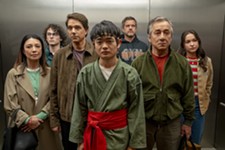The Liminal Lone Star State: Iliana Sosa’s El Paso in God Save Texas
HBO docuseries screens at AFS Cinema this weekend
By Richard Whittaker, 4:04PM, Fri. Mar. 1, 2024

Making a documentary is always a process of discovery. While Iliana Sosa was filming La Frontera, her episode of the new HBO series God Save Texas, there was a point in which she found herself looking at historical images that had never been seen before.
Although she now lives in Austin, Sosa returned to her native El Paso to tell that city’s story. During filming, she met with historian and author David Romo to discuss the Bracero program, the post-war agreement between the U.S. and Mexico to bring farm workers across the border under temporary agricultural permits. “I knew about the program because my grandfather was a bracero,” she said, “and he talked about, as he was crossing over the border, having to take your clothes off and having people inspecting you.”
What Romo showed her was actual photographs of that process – including the braceros being sprayed with insecticides. “Those images that are in the episode have only recently been developed.” Romo had found the undeveloped film in archives at the Smithsonian, “and it was shocking,” Sosa said. “They’re very reminiscent of a concentration camp, of Nazi Germany.”
Now those images are part of her contribution to God Save Texas, the three-part series adapted by HBO from Lawrence Wright’s book God Save Texas: A Journey Into the Soul of the Lone Star State. It begins withs Hometown Prison, in which director Richard Linklater heads to Hunstville, the center of Texas’ penal system and a city whose existence depends on the jobs at the prison. Part two, The Price of Oil, sees Houston native Alex Stapleton explore how the petrochemical business has affected every aspect of the city. La Frontera is Sosa’s look at her own hometown, and how immigration policies, racism, and gentrification are all working to bury El Paso’s already suppressed history.
All three films screen this weekend at AFS Cinema (6259 Middle Fiskville), with Linklater’s documentary screening Saturday, March 2 at 2pm (followed by a virtual Q&A between the director and Wright). Sosa and Stapleton’s films will play in a double bill together Sunday, March 3, 2pm. The screenings are free and open to the public (RSVP here).
This wasn’t the project that Sosa expected to make as the follow-up to her South By Southwest award-winning documentary, What We Leave Behind, about her grandfather, Julián. She had no plans to make such a personal film again so soon but came aboard after Evan Lerner, then senior creative executive at Jigsaw Productions, contacted her. He explained that the first two episodes had been shot, and they were looking for a filmmaker from El Paso to make a film about El Paso. “I wasn’t seeking it,” she said. “It just came my way.” As someone who loves the city and was tired of the one-note depiction of it as some pawn in the political battle over immigration policy, “it was a beautiful opportunity to represent it differently.”
Austin Chronicle: This is a personal film, and you’re a presence in front of the camera here. However, there’s a fascinating moment when you are actually being interviewed for your own film by Lawrence.
Iliana Sosa: I’d love to take credit for that, but it was already part of the format, to have Lawrence be part of the series because it’s based on his book and he’s executive producer.
When it came to mine, I already knew that each director was going to be on camera and it was going to be a personal film, but Larry was going to be part of that journey with us. In terms of working with him, he’s awesome and really amazing, and he has this beautiful curiosity about the world and especially Texas. He’s such a prolific writer and does such a deep dive about history, about Texas, and about what’s happening right now. He’s been to El Paso before but he’s seeing it in a different way compared to me, who was born and raised there. He was really empathetic of what’s going on there, and he’s well aware of who he is, being a white man and obviously we’re different generations, but he was always very open and very sweet. I really enjoyed the conversations that we had.
AC: El Paso’s fascinating because it’s barely Texas. Not because it’s so close to the border with Mexico but because it’s so far from anywhere else in Texas. It’s faster to drive to Phoenix than to Austin. It’s not even in the same time zone.
IS: And also we have our own power grid. So when the freeze happened, they were OK, my parents were OK.
But yes, it’s very far from the rest of Texas. It’s closer to New Mexico, culturally and visually too. … There’s a lot of deep history here, just like the rest of Texas, where families have been there for generations, even before Texas was Texas. But when people think about El Paso, certain images come to mind, and so for me it was great to be able to do this, and I hope that people see that El Paso is different to the rest of Texas, but it’s here, with all its cultures and contradictions.
A note to readers: Bold and uncensored, The Austin Chronicle has been Austin’s independent news source for over 40 years, expressing the community’s political and environmental concerns and supporting its active cultural scene. Now more than ever, we need your support to continue supplying Austin with independent, free press. If real news is important to you, please consider making a donation of $5, $10 or whatever you can afford, to help keep our journalism on stands.
May 31, 2025
HBO, God Save Texas, Iliana Sosa, La Frontera, Richard Linklater, Alex Stapleton, Lawrence Wright








